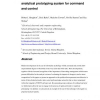Free Online Productivity Tools
i2Speak
i2Symbol
i2OCR
iTex2Img
iWeb2Print
iWeb2Shot
i2Type
iPdf2Split
iPdf2Merge
i2Bopomofo
i2Arabic
i2Style
i2Image
i2PDF
iLatex2Rtf
Sci2ools
CTW
2008
2008
WESTT (workload, error, situational awareness, time and teamwork): an analytical prototyping system for command and control
Modern developments in the use of information technology within command and control allow unprecedented degrees of flexibility in the way teams deal with tasks. These developments, together with the increased recognition of the importance of knowledge management within teams present difficulties for the analyst in terms of evaluating the impacts of changes to task or team composition. In this paper we present an approach to this problem that represents team behavior in terms of three linked networks (task, social and knowledge networks) that we have instantiated within the integrative WESTT software tool. By automating many analyses of workload and error we furthermore allow the user to engage in the process of rapid and iterative `analytical prototyping'. In addition, we also present an example of the use of this technique with regard to a proposed tactical vignette.
| Added | 25 Jan 2011 |
| Updated | 25 Jan 2011 |
| Type | Journal |
| Year | 2008 |
| Where | CTW |
| Authors | Robert J. Houghton, Chris Baber, Malcolm Cowton, Guy H. Walker, Neville A. Stanton |
Comments (0)

